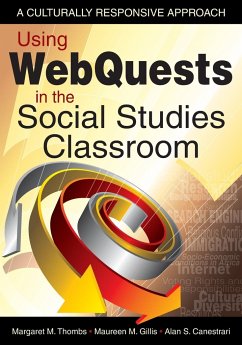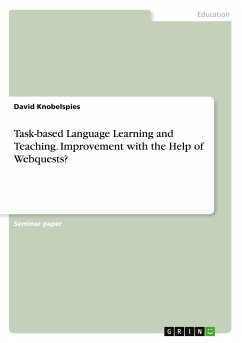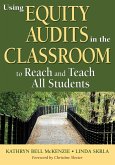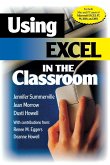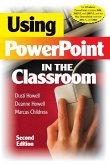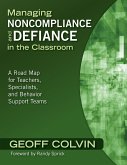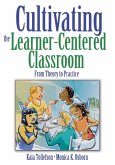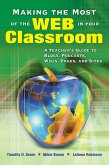Margaret M. Thombs, Maureen M. Gillis, Alan S. Canestrari
Using WebQuests in the Social Studies Classroom
A Culturally Responsive Approach
Margaret M. Thombs, Maureen M. Gillis, Alan S. Canestrari
Using WebQuests in the Social Studies Classroom
A Culturally Responsive Approach
- Broschiertes Buch
- Merkliste
- Auf die Merkliste
- Bewerten Bewerten
- Teilen
- Produkt teilen
- Produkterinnerung
- Produkterinnerung
This unique guide offers practical strategies for using WebQuests to optimize learning in social studies, foster student inquiry and higher-level thinking, and promote greater intercultural understanding.
Andere Kunden interessierten sich auch für
![Task-based Language Learning and Teaching. Improvement with the Help of Webquests? Task-based Language Learning and Teaching. Improvement with the Help of Webquests?]() David KnobelspiesTask-based Language Learning and Teaching. Improvement with the Help of Webquests?15,95 €
David KnobelspiesTask-based Language Learning and Teaching. Improvement with the Help of Webquests?15,95 €![Using Equity Audits in the Classroom to Reach and Teach All Students Using Equity Audits in the Classroom to Reach and Teach All Students]() Kathryn Bell McKenzieUsing Equity Audits in the Classroom to Reach and Teach All Students33,99 €
Kathryn Bell McKenzieUsing Equity Audits in the Classroom to Reach and Teach All Students33,99 €![Using Excel in the Classroom Using Excel in the Classroom]() Jennifer SummervilleUsing Excel in the Classroom27,99 €
Jennifer SummervilleUsing Excel in the Classroom27,99 €![Using PowerPoint in the Classroom Using PowerPoint in the Classroom]() Dusti HowellUsing PowerPoint in the Classroom29,99 €
Dusti HowellUsing PowerPoint in the Classroom29,99 €![Managing Noncompliance and Defiance in the Classroom Managing Noncompliance and Defiance in the Classroom]() Geoff ColvinManaging Noncompliance and Defiance in the Classroom34,99 €
Geoff ColvinManaging Noncompliance and Defiance in the Classroom34,99 €![Cultivating the Learner-Centered Classroom Cultivating the Learner-Centered Classroom]() Kaia TollefsonCultivating the Learner-Centered Classroom40,99 €
Kaia TollefsonCultivating the Learner-Centered Classroom40,99 €![Making the Most of the Web in Your Classroom Making the Most of the Web in Your Classroom]() Timothy D. GreenMaking the Most of the Web in Your Classroom78,99 €
Timothy D. GreenMaking the Most of the Web in Your Classroom78,99 €-
-
-
This unique guide offers practical strategies for using WebQuests to optimize learning in social studies, foster student inquiry and higher-level thinking, and promote greater intercultural understanding.
Hinweis: Dieser Artikel kann nur an eine deutsche Lieferadresse ausgeliefert werden.
Hinweis: Dieser Artikel kann nur an eine deutsche Lieferadresse ausgeliefert werden.
Produktdetails
- Produktdetails
- Verlag: Corwin
- Seitenzahl: 154
- Erscheinungstermin: 12. Juni 2008
- Englisch
- Abmessung: 254mm x 178mm x 9mm
- Gewicht: 304g
- ISBN-13: 9781412959513
- ISBN-10: 1412959519
- Artikelnr.: 23502548
- Herstellerkennzeichnung
- Libri GmbH
- Europaallee 1
- 36244 Bad Hersfeld
- gpsr@libri.de
- Verlag: Corwin
- Seitenzahl: 154
- Erscheinungstermin: 12. Juni 2008
- Englisch
- Abmessung: 254mm x 178mm x 9mm
- Gewicht: 304g
- ISBN-13: 9781412959513
- ISBN-10: 1412959519
- Artikelnr.: 23502548
- Herstellerkennzeichnung
- Libri GmbH
- Europaallee 1
- 36244 Bad Hersfeld
- gpsr@libri.de
Margaret Thombs is an associate professor of education specializing in instructional technology at Roger Williams University in Bristol, Rhode Island. She has taught secondary mathematics and computer science and was formerly the director of technology for the Middletown, Rhode Island Public Schools. Her areas of expertise include facilitating English as a Second Language skills using technology and technology-enabled family and local history research. She is a frequent presenter at national and regional technology and education conferences, and has authored a number of articles on technology integration in the classroom. She earned her PhD in computing technology in education from Nova Southeastern University.
Preface
Why This Book?
Real Voices... Typical Classroom Challenges
Practical, Usable Curriculum Content
Acknowledgments
About the Authors
1. The Challenge of Culturally Responsive Teaching
Meet Harrison Songolo
The Need for a Culturally Responsive Context
The Larger Narrative
Powerful Social Studies... Powerful Citizens
Imaginative Entry
The Quest for Connections
2. The Technologically Competent Social Studies Teacher
The NETS Project
Essential Conditions for Successful Technology Integration
Technology Resources
Special Considerations for Classroom Technology
Web Site Accessibility
Assistive Technology
Legal Implications
Online Technology Resources
3. The WebQuest Model
Background and History
Why Use the WebQuest Model?
Example WebQuest No. 1: Exploring Socio-Economic Conditions
One Zambia, One Nation?
4. Designing WebQuests
Core Components of a WebQuest
Introduction
Task
Process
Evaluation
Other Components of the Model
Design Process
Selecting a Primary Design Tool
QuestGarden
Assessing WebQuests
Online Resources
5. Getting Started: Learners, Topics, and Design Patterns
Getting Started
Anita's Classroom
Meet Happy-Hardy Guinguing
Brainstorming WebQuest Ideas
General Social Studies
Online Resources: Social Studies Topics
Culturally Responsive Topics
Online Resources: Cultural Sensitivity
Anita's Challenge: Teaching World Religions
Design Patterns
Example WebQuest No. 2: World Religions and Conflicts
Religious Conflict: Is an End in Sight?
6. Authentic and Engaging Tasks
Meet Juan Pablo Escoriza
Posing Authentic Problems to Challenge Thinking Skills
Brainstorming WebQuest Tasks
Exercises: Tasks From Example WebQuests in Previous Chapters
Chart of Possible Tasks
Online Resources
Example WebQuest No. 3: Immigration: Past, Present, and Future
Lights, Camera, Action! An Immigration Perspective
7. Evaluation Rubrics
Meet Vladimir Emilov Evtimov
Using Rubrics
Online Tools
How Many Rubrics?
Rubric Dimensions and Scale
Exercises: Evaluation Rubrics From Example WebQuests
Online Resources
Example WebQuest No. 4: Effective Use of Maps and Geographic Tools
Calling All Cartographers!
8. The WebQuest Process: How, What, and When
Meet Haseena Niazi
Teams and Roles
Exercises: Teams and Roles From Example WebQuests
Choosing Appropriate Resources
Internet Resources
Search Engines
Selecting Web Sites
Social Studies Links
Accessibility Issues
Copyright, Fair Use, and Citation of Sources
Other Resources
Exercises: Resources From Example WebQuests
Online Resources
Example WebQuest No. 5: Voting Rights and Responsibilities
Let Our Voices Be Heard!
9. Finalizing Your WebQuest Design
Meet Poroma Kanya
WebQuest Introductions
WebQuest Conclusions
Using Images and Other Tools
Teacher Page and Credits
Assessing Your WebQuest
Tom March's Seven Points for a Great WebQuest
10. The Challenge Ahead: A Quest for Peace
Humanistic Education
Choices for the 21st-Century Education Program
A Workable Peace
Freedom Writers
A Final Quest
Keeping the Quest Alive
Other Resources
A. Ten Thematic Strands in Social Studies
B. National Education Technology Standards for Students
C. Sites for Selecting Specialized Resources
D. Standards Associated With Example WebQuests
References
Suggested Readings: Cultural Responsiveness in the Classroom
Index
Why This Book?
Real Voices... Typical Classroom Challenges
Practical, Usable Curriculum Content
Acknowledgments
About the Authors
1. The Challenge of Culturally Responsive Teaching
Meet Harrison Songolo
The Need for a Culturally Responsive Context
The Larger Narrative
Powerful Social Studies... Powerful Citizens
Imaginative Entry
The Quest for Connections
2. The Technologically Competent Social Studies Teacher
The NETS Project
Essential Conditions for Successful Technology Integration
Technology Resources
Special Considerations for Classroom Technology
Web Site Accessibility
Assistive Technology
Legal Implications
Online Technology Resources
3. The WebQuest Model
Background and History
Why Use the WebQuest Model?
Example WebQuest No. 1: Exploring Socio-Economic Conditions
One Zambia, One Nation?
4. Designing WebQuests
Core Components of a WebQuest
Introduction
Task
Process
Evaluation
Other Components of the Model
Design Process
Selecting a Primary Design Tool
QuestGarden
Assessing WebQuests
Online Resources
5. Getting Started: Learners, Topics, and Design Patterns
Getting Started
Anita's Classroom
Meet Happy-Hardy Guinguing
Brainstorming WebQuest Ideas
General Social Studies
Online Resources: Social Studies Topics
Culturally Responsive Topics
Online Resources: Cultural Sensitivity
Anita's Challenge: Teaching World Religions
Design Patterns
Example WebQuest No. 2: World Religions and Conflicts
Religious Conflict: Is an End in Sight?
6. Authentic and Engaging Tasks
Meet Juan Pablo Escoriza
Posing Authentic Problems to Challenge Thinking Skills
Brainstorming WebQuest Tasks
Exercises: Tasks From Example WebQuests in Previous Chapters
Chart of Possible Tasks
Online Resources
Example WebQuest No. 3: Immigration: Past, Present, and Future
Lights, Camera, Action! An Immigration Perspective
7. Evaluation Rubrics
Meet Vladimir Emilov Evtimov
Using Rubrics
Online Tools
How Many Rubrics?
Rubric Dimensions and Scale
Exercises: Evaluation Rubrics From Example WebQuests
Online Resources
Example WebQuest No. 4: Effective Use of Maps and Geographic Tools
Calling All Cartographers!
8. The WebQuest Process: How, What, and When
Meet Haseena Niazi
Teams and Roles
Exercises: Teams and Roles From Example WebQuests
Choosing Appropriate Resources
Internet Resources
Search Engines
Selecting Web Sites
Social Studies Links
Accessibility Issues
Copyright, Fair Use, and Citation of Sources
Other Resources
Exercises: Resources From Example WebQuests
Online Resources
Example WebQuest No. 5: Voting Rights and Responsibilities
Let Our Voices Be Heard!
9. Finalizing Your WebQuest Design
Meet Poroma Kanya
WebQuest Introductions
WebQuest Conclusions
Using Images and Other Tools
Teacher Page and Credits
Assessing Your WebQuest
Tom March's Seven Points for a Great WebQuest
10. The Challenge Ahead: A Quest for Peace
Humanistic Education
Choices for the 21st-Century Education Program
A Workable Peace
Freedom Writers
A Final Quest
Keeping the Quest Alive
Other Resources
A. Ten Thematic Strands in Social Studies
B. National Education Technology Standards for Students
C. Sites for Selecting Specialized Resources
D. Standards Associated With Example WebQuests
References
Suggested Readings: Cultural Responsiveness in the Classroom
Index
Preface
Why This Book?
Real Voices... Typical Classroom Challenges
Practical, Usable Curriculum Content
Acknowledgments
About the Authors
1. The Challenge of Culturally Responsive Teaching
Meet Harrison Songolo
The Need for a Culturally Responsive Context
The Larger Narrative
Powerful Social Studies... Powerful Citizens
Imaginative Entry
The Quest for Connections
2. The Technologically Competent Social Studies Teacher
The NETS Project
Essential Conditions for Successful Technology Integration
Technology Resources
Special Considerations for Classroom Technology
Web Site Accessibility
Assistive Technology
Legal Implications
Online Technology Resources
3. The WebQuest Model
Background and History
Why Use the WebQuest Model?
Example WebQuest No. 1: Exploring Socio-Economic Conditions
One Zambia, One Nation?
4. Designing WebQuests
Core Components of a WebQuest
Introduction
Task
Process
Evaluation
Other Components of the Model
Design Process
Selecting a Primary Design Tool
QuestGarden
Assessing WebQuests
Online Resources
5. Getting Started: Learners, Topics, and Design Patterns
Getting Started
Anita's Classroom
Meet Happy-Hardy Guinguing
Brainstorming WebQuest Ideas
General Social Studies
Online Resources: Social Studies Topics
Culturally Responsive Topics
Online Resources: Cultural Sensitivity
Anita's Challenge: Teaching World Religions
Design Patterns
Example WebQuest No. 2: World Religions and Conflicts
Religious Conflict: Is an End in Sight?
6. Authentic and Engaging Tasks
Meet Juan Pablo Escoriza
Posing Authentic Problems to Challenge Thinking Skills
Brainstorming WebQuest Tasks
Exercises: Tasks From Example WebQuests in Previous Chapters
Chart of Possible Tasks
Online Resources
Example WebQuest No. 3: Immigration: Past, Present, and Future
Lights, Camera, Action! An Immigration Perspective
7. Evaluation Rubrics
Meet Vladimir Emilov Evtimov
Using Rubrics
Online Tools
How Many Rubrics?
Rubric Dimensions and Scale
Exercises: Evaluation Rubrics From Example WebQuests
Online Resources
Example WebQuest No. 4: Effective Use of Maps and Geographic Tools
Calling All Cartographers!
8. The WebQuest Process: How, What, and When
Meet Haseena Niazi
Teams and Roles
Exercises: Teams and Roles From Example WebQuests
Choosing Appropriate Resources
Internet Resources
Search Engines
Selecting Web Sites
Social Studies Links
Accessibility Issues
Copyright, Fair Use, and Citation of Sources
Other Resources
Exercises: Resources From Example WebQuests
Online Resources
Example WebQuest No. 5: Voting Rights and Responsibilities
Let Our Voices Be Heard!
9. Finalizing Your WebQuest Design
Meet Poroma Kanya
WebQuest Introductions
WebQuest Conclusions
Using Images and Other Tools
Teacher Page and Credits
Assessing Your WebQuest
Tom March's Seven Points for a Great WebQuest
10. The Challenge Ahead: A Quest for Peace
Humanistic Education
Choices for the 21st-Century Education Program
A Workable Peace
Freedom Writers
A Final Quest
Keeping the Quest Alive
Other Resources
A. Ten Thematic Strands in Social Studies
B. National Education Technology Standards for Students
C. Sites for Selecting Specialized Resources
D. Standards Associated With Example WebQuests
References
Suggested Readings: Cultural Responsiveness in the Classroom
Index
Why This Book?
Real Voices... Typical Classroom Challenges
Practical, Usable Curriculum Content
Acknowledgments
About the Authors
1. The Challenge of Culturally Responsive Teaching
Meet Harrison Songolo
The Need for a Culturally Responsive Context
The Larger Narrative
Powerful Social Studies... Powerful Citizens
Imaginative Entry
The Quest for Connections
2. The Technologically Competent Social Studies Teacher
The NETS Project
Essential Conditions for Successful Technology Integration
Technology Resources
Special Considerations for Classroom Technology
Web Site Accessibility
Assistive Technology
Legal Implications
Online Technology Resources
3. The WebQuest Model
Background and History
Why Use the WebQuest Model?
Example WebQuest No. 1: Exploring Socio-Economic Conditions
One Zambia, One Nation?
4. Designing WebQuests
Core Components of a WebQuest
Introduction
Task
Process
Evaluation
Other Components of the Model
Design Process
Selecting a Primary Design Tool
QuestGarden
Assessing WebQuests
Online Resources
5. Getting Started: Learners, Topics, and Design Patterns
Getting Started
Anita's Classroom
Meet Happy-Hardy Guinguing
Brainstorming WebQuest Ideas
General Social Studies
Online Resources: Social Studies Topics
Culturally Responsive Topics
Online Resources: Cultural Sensitivity
Anita's Challenge: Teaching World Religions
Design Patterns
Example WebQuest No. 2: World Religions and Conflicts
Religious Conflict: Is an End in Sight?
6. Authentic and Engaging Tasks
Meet Juan Pablo Escoriza
Posing Authentic Problems to Challenge Thinking Skills
Brainstorming WebQuest Tasks
Exercises: Tasks From Example WebQuests in Previous Chapters
Chart of Possible Tasks
Online Resources
Example WebQuest No. 3: Immigration: Past, Present, and Future
Lights, Camera, Action! An Immigration Perspective
7. Evaluation Rubrics
Meet Vladimir Emilov Evtimov
Using Rubrics
Online Tools
How Many Rubrics?
Rubric Dimensions and Scale
Exercises: Evaluation Rubrics From Example WebQuests
Online Resources
Example WebQuest No. 4: Effective Use of Maps and Geographic Tools
Calling All Cartographers!
8. The WebQuest Process: How, What, and When
Meet Haseena Niazi
Teams and Roles
Exercises: Teams and Roles From Example WebQuests
Choosing Appropriate Resources
Internet Resources
Search Engines
Selecting Web Sites
Social Studies Links
Accessibility Issues
Copyright, Fair Use, and Citation of Sources
Other Resources
Exercises: Resources From Example WebQuests
Online Resources
Example WebQuest No. 5: Voting Rights and Responsibilities
Let Our Voices Be Heard!
9. Finalizing Your WebQuest Design
Meet Poroma Kanya
WebQuest Introductions
WebQuest Conclusions
Using Images and Other Tools
Teacher Page and Credits
Assessing Your WebQuest
Tom March's Seven Points for a Great WebQuest
10. The Challenge Ahead: A Quest for Peace
Humanistic Education
Choices for the 21st-Century Education Program
A Workable Peace
Freedom Writers
A Final Quest
Keeping the Quest Alive
Other Resources
A. Ten Thematic Strands in Social Studies
B. National Education Technology Standards for Students
C. Sites for Selecting Specialized Resources
D. Standards Associated With Example WebQuests
References
Suggested Readings: Cultural Responsiveness in the Classroom
Index

